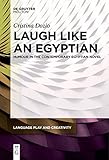Laugh like an Egyptian : Humour in the Contemporary Egyptian Novel / Cristina Dozio.
Material type: TextSeries: Language Play and Creativity [LPC] ; 5Publisher: Berlin ; Boston : De Gruyter Mouton, [2021]Copyright date: ©2021Description: 1 online resource (XV, 232 p.)Content type:
TextSeries: Language Play and Creativity [LPC] ; 5Publisher: Berlin ; Boston : De Gruyter Mouton, [2021]Copyright date: ©2021Description: 1 online resource (XV, 232 p.)Content type: - 9783110725292
- 9783110725513
- 9783110725414
- Arabic fiction -- Egypt -- History and criticism
- Arabic literature -- 20th century -- History and criticism
- Egyptian wit and humor -- History and criticism
- humor in fiction
- Humor
- Sprachliche Variation
- Ägyptische Literatur
- LANGUAGE ARTS & DISCIPLINES / Linguistics / General
- Contemporary Egyptian Literature
- Humour (fukāha)
- Linguistic Variation (Modern Standard Arabic / Egyptian Colloquial Arabic)
- Wise Fool
- 892.7/360917 23/eng/20230216
- online - DeGruyter
- Issued also in print.
| Item type | Current library | Call number | URL | Status | Notes | Barcode | |
|---|---|---|---|---|---|---|---|
 eBook
eBook
|
Biblioteca "Angelicum" Pont. Univ. S.Tommaso d'Aquino Nuvola online | online - DeGruyter (Browse shelf(Opens below)) | Online access | Not for loan (Accesso limitato) | Accesso per gli utenti autorizzati / Access for authorized users | (dgr)9783110725414 |
Browsing Biblioteca "Angelicum" Pont. Univ. S.Tommaso d'Aquino shelves, Shelving location: Nuvola online Close shelf browser (Hides shelf browser)

|

|

|

|

|

|

|
||
| online - DeGruyter Reconstructing Satyr Drama / | online - DeGruyter Tefillin and Mezuzot from Qumran : New Readings and Interpretations / | online - DeGruyter Politische Emotionen in den Künsten / | online - DeGruyter Laugh like an Egyptian : Humour in the Contemporary Egyptian Novel / | online - DeGruyter Bayerisches Wörterbuch (BWB). Band 4/Heft 29, [Buben]trätzer – [Kürzer]dreier / | online - DeGruyter Men Do It Too : Opting Out and In / | online - DeGruyter Image Acts : A Systematic Approach to Visual Agency / |
Frontmatter -- Acknowledgments -- Contents -- Note on transliteration -- Bibliographic reference for the novels -- Introduction -- 1 A laughable tradition -- 2 Masters of humour -- 3 Reversed epics. Nuʿmān, the village antihero -- 4 Ibn Shalabī, a (pre-)modern trickster -- 5 Laughing together at the hash den -- 6 Laughing together at migration -- 7 A comparative look -- Conclusions -- Bibliography -- Websites and videos -- Index
restricted access online access with authorization star
http://purl.org/coar/access_right/c_16ec
Egyptians are known among the Arabs as awlād al-nukta, Sons of the Jokes, for their ability to laugh in face of adversity. This creative weapon has been directed against socio-political targets both in times of oppression and popular upheaval, such as the 2011 Tahrir Revolution. This book looks at the literary expression of Egyptian humour in the novels of Muḥammad Mustajāb, Khayrī Shalabī, and Ḥamdī Abū Julayyil, three writers who revive the comic tradition to innovate the language of contemporary fiction. Their modern tricksters, wise fools, and antiheroes play with the stereotypical traits attached to the ordinary Egyptians, while laughing at the universal contradictions of life. This ability to combine local and global culture, literary traditions and popular references, makes them a stimulating read in an intercultural perspective. Combining humour studies and literary criticism, this book examines language play and narrative creativity to understand which strategies craft Egyptian literary humour. In doing so, it sheds light on the contribution of humour to literary innovations of Egyptian fiction since the late Seventies, while adding new writers to those who are considered the masters of humour in the Arab novel.
Issued also in print.
Mode of access: Internet via World Wide Web.
In English.
Description based on online resource; title from PDF title page (publisher's Web site, viewed 25. Jun 2024)


